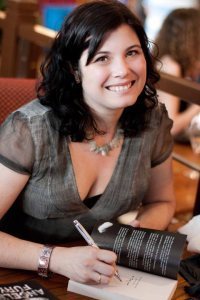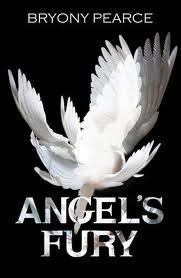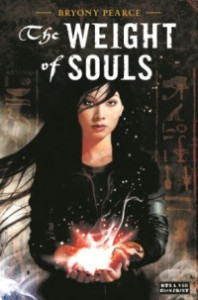Banned Books Month: Guest Post from Bryony Pearce: Hiding the controversy
I’ll admit it: although you may not realise it, I write “issues” fiction. There are reasons that you may not realise it. Here are a handful of reviews about THE WEIGHT OF SOULS:
“It grips you from the first page … This book is just the right side of supernatural meets mystery with just enough pinch of romance in to keep a romance-junkie like me happy.”
“THE WEIGHT OF SOULS hooked me from “jump” and proved to be quite the page-turner with an incredible blend of action, teen characterization, and nicely woven romance arc between two most Unlikely characters. And Anubis.”
Egmont UK, June 2012.
And ANGEL’S FURY:
“Gripping book from start to finish. Very clever story, told in an exciting and at times nail-biting way. Thoroughly recommend.”
“Bryony Pearce gives us a supernatural thriller with touches of historical fiction and a dash of romance.”
My reviews talk about how I write gripping stories; they mention the supernatural elements, the romance, the action. Rarely do they mention the ‘issues’ and that is fine with me; they’re meant to be hidden.
Traditional “issues” fiction such as Jennifer Brown’s wonderful HATE LIST have reviews that say things like “powerful,” “emotionally draining” and “an awful subject that is handled sensitively.”
When I think of issues fiction I think of books like Dave Cousins’ 15 DAYS WITHOUT A HEAD, or the aforementioned HATE LIST, MY SISTER’S KEEPER or JUNK (retitled SMACK in the US). These books are page turners, certainly, but to me they are too powerful, too emotionally draining; I often have to stop reading them, just to have a think. Sometimes I have to step away from the book completely and give myself some time. When the book is finished the “issue” is what I remember most about it. And that is brilliant. These books teach on a very conscious level, engender discussion and the best of them can even bring about social change.
That however, is not what I want to do. I want teenagers to read my books and go away thinking about the characters, the story, the “cool” supernatural stuff. The issue I’ve really written about, well, it might just sink in without them realising it was even there.
ANGEL’S FURY was about what people will do to other people, about man-as-monster. I researched Milgram’s obedience to authority experiment (I have a great version that I use during school visits). I looked closely at Nazism; I researched Hitler’s rise to power and the Hitler Youth. I tried to comprehend how the things that happened in Germany might have occurred and I drew myself a character who was a hateful Nazi, who somehow turns out to have redeeming features. I hid all of that in a story about fallen angels and reincarnation, a supernatural love story / paranormal thriller. In doing so I was being controversial in a different way. My editor worried that this was the first book that has dealt with the second world war without being about the second world war; the first book that has ‘used’ the murder of a group of Jews without being ‘about’ the murder. She worried that I was going to be accused of treating the issue too lightly. She need not have worried, ANGEL’S FURY has won two awards and been long-listed for others.
My second novel, THE WEIGHT OF SOULS is secretly about bullying. It is about fitting in and the stupid stuff that we do when we’re trying to belong. I researched deindividuation theory and dove into my own history of being tormented at school and my memories of other children who suffered even more; a boy in my class so terrified of walking home alone that he used to hide a brick in his school bag.
Strange Chemistry, August 2013.
Bullying is a subject that has always interested me. I have been bullied in various ways; I was an RAF kid and in every new place there was at least one group who took against me. I’ve been called a gypsy, a gorilla, a rock cake (insulting term for a Roman Catholic), frigid, a whore, a slut. I’ve had food rubbed in my hair, I’ve been buried in a sand pit, I’ve been sexually assaulted, I’ve been laid upon at the bus stop more than once, sometimes by more than one person at a time. I’ve been beaten up on the school bus, in the playground. To be fair I often gave as good as I got and occasionally threw the first punch. But the incident that really sticks in my mind, the incident that I secretly write about over and over again is the one that really hurt me.
When I was eleven or twelve I was pretty happy at school. My family had remained in the same place for three years by then and I had some good friends, I was doing well in lessons and I had overcome the crippling shyness that had been worrying parents and teachers alike. Then, as girls do, I fell out with my best friend.
My best friend was generally better liked than me, particularly by the boys (she was, shall we say, physically advanced for her age). So when the two of us fell out, to my surprise, instead of leaving us to sort it out between ourselves, the class took sides – her side. People that I had considered friends turned on me and I literally was forced to sit alone in a corner of the room for every lesson as they moved their things and sat elsewhere. The teacher never said anything. As the whole class chanted, ‘get out, get out, no-one wants you in here.’ She continued to say nothing.
Then the physical assaults started: kicks, knocks, subtle punches as classmates walked past. Finally I was attacked in the dinner queue, viciously punched by a boy who I’d had a crush on for ages. I was bruised on the outside, but devastated on the inside.
One girl noticed that I was done. When I was about to crumple in the face of the chanting she walked up to the teacher and said. “I don’t think Bryony should sit by herself anymore. I want her to sit at my table.”
Out of a class of almost thirty children, one girl had the integrity and the guts to stand up and gave me a life-line. One.
How was it that every child, bar one, was happy to join in with a chant that demanded a class mate leave the room, even though there was no way she would have been allowed to? How was it that these children felt comfortable escalating to physical violence? And how was it that the teacher never felt able to say a word?
Maybe I was just that disliked. Maybe the teacher secretly hated me…but maybe something else was going on.
Deindividuation says that we merge our identities with that of the group and become anonymous, that this allows us to lose our inhibitions. There is also something called Social Learning Theory which suggests that simply observing another’s actions can lead to a person learning that behaviour as long there is no punishment and a favourable outcome (the teacher never punished and the favourable outcome was the approval of the popular girl). I believe that I was at the centre of an inadvertent social experiment that showed, at least to me, how people can lose their personalities in a group.
So this is something I explore in all of my books: how a group of good people can become a group of howling monsters. In ANGEL’S FURY we have the Nazi party and in THE WEIGHT OF SOULS we find the V Club, they have a name (some members even tattoo it on themselves), they have a leader, posters, a salute. The club behaves in a way that outsiders would consider insane and their actions have escalated out of control. But none of them stop, none of them back out, when you’re in the V club you just “do what you do:” Deindividuation.
So, although it looks as if I write gripping page-turners about ghosts, gods, fallen angels, reincarnation and superheroes (my current WIP), I do actually write issues fiction. I have things that I want to explore and understand through my writing, but I don’t want to ram my conclusions down people’s throats. I just want readers to observe what I have done and to see what I have seen. To allow that to sink in quietly, I distract them with fallen angels, an army of zombified murderers, a few ghosts and an Egyptian God.
Writing issues fiction is scary. It is very easy for people to point and say I got it wrong, that it doesn’t apply or that I’ve caused offence. To those people I say; “What? Issues fiction? Are you mad, this is a book about ghosts.”

Bryony Pearce.
Bryony Pearce completed an English Literature degree at Corpus Christi College, Cambridge in 1998 and afterwards worked in the research industry. After a while she moved to a village at the edge of the Peak District and went freelance so she could devote more time to writing. She is now a full time mother to two children, writes as much as possible and enjoys doing school visits and events when she can fit them in. Her first book, the award winning ANGEL’S FURY, was published by Egmont UK in 2011 and released in the US in 2012.. Her latest, THE WEIGHT OF SOULS, was just released by Strange Chemistry. For more information on Bryony, please visit her at www.bryonypearce.co.uk, follow her on Twitter @BryonyPearce or like her Facebook page BryonyPearceAuthor.










